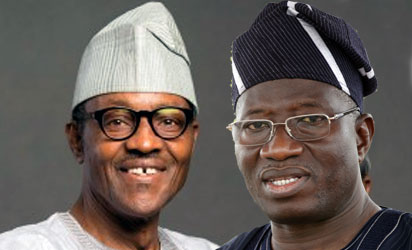A BATTLEGROUND is a place where an election will be keenly contested between two or more major political parties or their candidates. Of Nigeria’s three traditional “tripod zones” where the nation’s demographic ethnic majorities live – Arewa Muslim North, the food basket of Nigeria; Igbo heartland South East, the engine room of the Nigerian society; and Yoruba homeland South West, the landlords of the Nigerian economy – the hunt for votes between President Goodluck Jonathan of the ruling Peoples Democratic Party (PDP) and General Muhammadu Buhari of the All Progressive Congress (APC), will be fiercest in the South West come 28th March, 2015.
By general perception, Jonathan will sweep the polls in the South East, South-South and the Minority/Christian areas all over the country. Buhari will win comfortably in the Muslim North, or so it seems. Yes, there will be those who will not respect the primordial instinct to vote along ethnic and religious lines in these areas, opting, instead, to follow their minds, the interests of their political parties or directives of their local leaders. But the impact of those who will vote according to the block or herd sentiments of their people cannot be downplayed.
The South West is a very interesting political phenomenon. If you ask an average South Westerner, he will tell you they are “sophisticated” voters. As this term has never been properly defined for us to match it with the established political behaviour of the Yorubas, let me observe that there is flux in the South West right now. We can trace where it started and why. The political vision and philosophy of the late Chief Obafemi Awolowo (or “Awoism”) established some 68 years ago: bottom-up federalism (which is fondly called “true federalism, where the states or regions exercise widespread autonomy) greased by the principles of social welfare, has been in vogue. It helped the West to thrive in the past, and the people are, therefore, firmly attached to it.
But, Awoism has been severely eroded by a new political mainstream led by Asiwaju Ahmed Bola Tinubu. The battle in the South West in the impending presidential election will be fought between the political camp led by Tinubu with its strong support for General Buhari and the motely groups of Awoists and Yoruba leaders who have been regrouping under various platforms and massing up for President Jonathan.
Before now, the Yoruba mainstream has always been strong and unmistakable. They were always known for their block votes for “progressive” parties such as the Action Group (AG), Unity Party of Nigeria (UPN), the Social Democratic Party (SDP) and the Alliance for Democracy (AD). Tinubu and the old Awoists now on the other side were once part of the Afenifere/National Democratic Coalition (NADECO), which fought for the restoration of Chief Moshood Abiola’s June 12th 1993 annulled presidential mandate. Following the death of Abiola, they all converged on a new political party formed by the late Chief Bola Ige – the AD.
Tinubu, a frontline foot soldier of the struggle had just returned from exile in 1998. As a reward for his contributions, he was given the AD ticket for Lagos State ahead of Engineer Funsho Williams, who had been building grassroots structures during the regime of Col. Buba Marwa, when he served as a very successful Commissioner for Works. However, the Awoists (Afenifere/NADECO) weakened under Chief Abraham Adesanya, both as a result of his prolonged age-related illness and their ill-fated decision to support a Yoruba son, President Olusegun Obasanjo for his 2003 re-election. The Owu general, an avowed enemy of Awoism,seized that opportunity to destroy the Awoists and impose the PDP as the new Yoruba mainstream between 2003 and 2007. Chief Ige, who was Obasanjo’s Minister of Justice, was murdered in December, 2001, and the Awoists lost political direction.
It was only Tinubu, among the six AD South West governors, who refused to go with Obasanjo. He formed his own party, the Action Congress (AC). In spite of Obasanjo’s blockage of federal allocations to Lagos local government councils Tinubu not only prevailedbut also built a new platform which, after retaking the South West from PDP, has now become part of a national opposition movement (APC) which he leads. APC, however, is definitely not a typical Awoist welfarist party. It is more of an ultra-capitalist platform that goes as far as tolling roads and bridges. Tinubu was an advocate of “true federalism” and state police, but when President Jonathan offered to empanel the National Conference, he kicked against it. However, many of the old Awoists, such as Chief Ayo Adebanjo, Chief Olu Falae, the rival Odua People’s Congress Leaders (OPC), Dr. Frederick Faseun and Otunba Gani Adams, Chief Femi Okunrounmu, Chief Segun Osoba and others, went to the Conference.
Today, the old Awoists are regrouping under various platforms. Falae’s SDP is strong in Ogun State and growing in the South West. Faseun has resuscitated the UPN. PDP has bounced back in Ondo and Ekiti States, and it is strong throughout the zone. The Accord Party is waxing strong in Oyo State. These and other groups, backed by the Yoruba leadership, are queuing up behind Jonathan. But Tinubu’s APC still controls four Yoruba states such as Lagos, Ogun, Osun and Oyo. Its vibrant media backbone with deadly propaganda credentialswas mobilised to rebrand Buhari and contrive a newspaper momentum that initially scared the ruling PDP and forced it back to the drawing board.
Jonathan has potentiated his forays in the South West since the polls shift. The President has engaged every layer of the South West society – traditional rulers, the youth and the grassroots. He has also struck a live chord with Awoists by promising to implement the Conference report. Meanwhile, Buhari is lost somewhere in London, “resting” or “recuperating”.
It is game on in the South West as we march towards 28th, but it is obvious that President Jonathan has the new momentum there.
VANGUARD
END


Be the first to comment